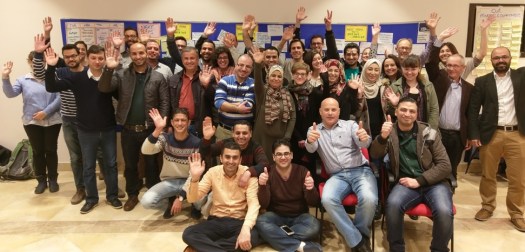 This is the 5th of a series of six weekly posts to mark International Facilitation Week 2017, starting just 1 week from today. Drafted as I enjoyed a welcome opportunity to pause and reflect this summer, the posts share a series of examples of how I have applied, customised and adapted the ToP Consensus Workshop method in my practice over the past year.
This is the 5th of a series of six weekly posts to mark International Facilitation Week 2017, starting just 1 week from today. Drafted as I enjoyed a welcome opportunity to pause and reflect this summer, the posts share a series of examples of how I have applied, customised and adapted the ToP Consensus Workshop method in my practice over the past year.
How will you celebrate and promote the power of facilitation this year? Please share online with the #FacWeek hashtag, or in a comment below…
Example 5 – Eurochild, Brussels
A good example of both customised design and adaptation in the moment was the General Assembly in Brussels in April of Eurochild, ‘a network of organisations and individuals working in and across Europe to promote the rights and well-being of children and young people‘. This involved around 100 individual members and member representatives plus Board members and Secretariat staff over two days.
One morning of the GA was designed as an opportunity to engage members in a year-long process to develop a new strategy for the network as a whole for 2019-21. The event had been preceded by an online survey of members, and was followed by a Participatory Strategic Planning retreat with Board, staff and a few key member representatives to develop the basis of the new strategy – for more in-depth consultation this autumn, with a view to final adoption at the next GA in April 2018. The Focus Question for the planning process as a whole was ‘How could Eurochild best mobilise and add value to the work of its members from 2019-21, to promote the rights & well-being of children & young people in Europe?‘
The design of the half-day member consultation began with an opening conversation and brief contextual presentations, followed by a 90 minute Consensus Workshop and then a series of ‘World Café’ style table conversations – to brainstorm and capture ideas for the Practical Vision, Current Reality and Strategic Directions stages of the Participatory Strategic Planning process respectively.
Participants sat at 13 pre-assigned tables of 8, each hosted by a Board or staff member. The workshop process was ‘super-sized’ as with ICUU, with whole-A4 sheets for writing ideas and all table hosts coming to the sticky wall at once to share ideas in turn and cluster quickly in columns under symbols as they did so. Cluster titles were drafted at tables and accepted without lengthy discussion or revision.
Also as with ICUU, it had been clear in the design process that a deep level of consensus would not be possible with such a large group in such a short time. It was also clear that such a consensus would not be necessary for this workshop, just one consultative element in a much longer and more elaborate process of consensus building over the course of a year.
The adaptation in the moment came in the Naming stage of the workshop. The Focus Question was ‘What would make us happy that the strategic planning process has been a success? (in terms of the new strategy & membership model themselves, in terms of member engagement in the process, and otherwise)’. The intent had been that the resulting ‘indicators of success’ would serve as guidelines and a means of accountability for the process of strategy development and member engagement over the year, and that substantive content for the new strategy would be contributed during the following World Cafe session.
What happened was that many of the ideas contributed in the workshop were in fact answers to the Practical Vision question ‘What do we want to see in place by 2021 as a result of delivering our new strategy? (how will Eurochild be different, and what difference will Eurochild have made?)‘. It made no sense to address the Vision question again separately, and it seemed to make more sense to accept that the group was ready to work on its Vision right away rather than to spend time first trying to name indicators of success. So what we did was to cluster the mix of ideas into 11 columns representing 11 vision elements, with just the original symbol to identify each. Then participants self-selected into 11 table groups to name the vision element on a flip chart, and also articulate relative to that element any indicators of success, current reality and practical projects and initiatives.
 Jana Hainsworth, Secretary General at Eurochild, wrote in September:
Jana Hainsworth, Secretary General at Eurochild, wrote in September:
“Great that we had structure, but also great that we could think on our feet to adjust the planning according to what we were hearing from members. All in all we got a huge amount of raw material for development of the strategic plan. The methodology clearly helped.”
Read on for example 6…
For more on my work, and what others have to say about it, please see how I work, who I work with and recommendations & case studies – or view my profile and connect with me on LinkedIn.
You can connect with me also by joining my free facilitation webinars online, and IAF England & Wales’ free facilitation meetups in London and elsewhere.
Like this:
Like Loading...
 What skills, knowledge, and behaviours must facilitators have in order to be successful facilitating in a wide variety of environments? To what extent do these vary, if at all, when working online rather than face-to-face? What can we do, individually and together as Agilists and as peers, to develop our own facilitation competence?
What skills, knowledge, and behaviours must facilitators have in order to be successful facilitating in a wide variety of environments? To what extent do these vary, if at all, when working online rather than face-to-face? What can we do, individually and together as Agilists and as peers, to develop our own facilitation competence? Thank you again to all those that attended this session last week during Facilitation Week, and especially to Agile Tour London for the invitation and to Megan Evans for co-hosting with me.
Thank you again to all those that attended this session last week during Facilitation Week, and especially to Agile Tour London for the invitation and to Megan Evans for co-hosting with me.



 So that is what we did. That allowed time then for members to self-select into three teams to to articulate the UK’s new strategic focus for each of the three areas, and to propose collective commitments.
So that is what we did. That allowed time then for members to self-select into three teams to to articulate the UK’s new strategic focus for each of the three areas, and to propose collective commitments.


